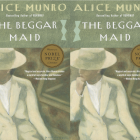My Meta Blog
Guest post by Bridget Lowe
I still remember the first blog I ever saw–it must have been 2000 or so, and my friend Adam had created a place online for his hilarious interpretations of interracial buddy films of the 1980s and ’90s. I was completely enthralled and mystified by this external, widely accessible version of my friend. So when my first piece for “Get Behind the Plough” was posted, I excitedly emailed my entire family to check it out.
I had tried blogging once before and found that unfortunately I didn’t seem to have much to say–at least not in that format. Blogging seemed to me at the time a unique mix of journalism and conversation–and indeed the “weblogs” early days were closer to online diaries than anything else. But as a year on the college paper taught me, I wasn’t any good at journalism, preferring to just chat off record with interviewees. And as my diaries from throughout my life constantly remind me, I have trouble sustaining interest in myself in that way.
So while certain blogs were making international waves in politics and inspiring movie deals, I posted snippets my cat Ursula typed by walking on the keyboard, a picture of Rasputin’s alleged penis, preserved like a giant grey pickle in a jar, and a video of myself singing a song I wrote, which I had recorded with my camera so I didn’t forget the chords. And then I abandoned it, like every other journal I’d started.
Ursula, blogger
While talking to my dad a few days after I’d sent this email announcing my inaugural post, I eagerly asked him what he thought. He seemed somewhat ambivalent, and because I have been spoiled by the blind enthusiasm of my parents on behalf of my endeavors large and small since childhood, I was a bit baffled. He then admitted that he didn’t really understand how a blog is connected to a literary magazine. His response was not based on opposition or a purist’s argument–he truly didn’t understand the relationship between an abstraction like a blog and a literary journal one could purchase and hold in one’s hand.
I told him the blog is supplemental to the literary journal, providing more regular contact with the readership, and that having a web presence is a vital part of a journal’s livelihood. But I could also relate to his confusion. While at Syracuse University, Renaissance scholar Dr. Dympna Callaghan would repeatedly ask our class What is poetry for? I love that question, and think the same can be asked of the blog, especially considering that its unique allure is directly related to its flexible, catch-all, social quality.
I’ve enjoyed seeing what I could do in the small space I have so kindly been afforded over these last few months. Every single thing I have written for the blog so far has been fueled by alternating self-doubt and enthusiasm–it was a constant self-conversation about blogs, blogging, and bloggers. Ultimately, I was reminded that confronting a new form is a writer’s dream–all of that crippling confusion is highly generative in some way, shape or future form, often sooner rather than later.
I still don’t know what constitutes a blog, other than its method of delivery. Do you? How do we know a blog is a blog and not something else? Do you blog? With an estimated 175,000 new ones created each day, I think of the Sylvia Plath poem “Mushrooms” and the disturbing rapidity of reproduction it captures: “So many of us! / So many of us!” her mushrooms victoriously exclaim. While I don’t think the rapid proliferation of blogs has any kind of ominous subtext, I do find the sheer amount of them thrilling and fascinating. With purposes so varied that the term “blog” is beginning to seem linguistically lazy, this new format is the most exciting thing in technology since I first signed on to AOL at a friend’s house in 8th grade.
This is Bridget’s eleventh post for Get Behind the Plough.



